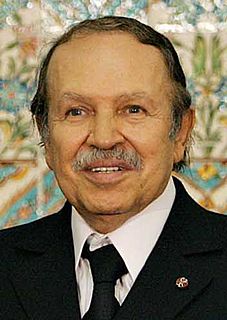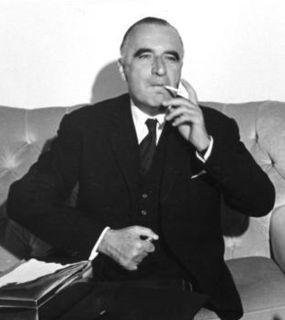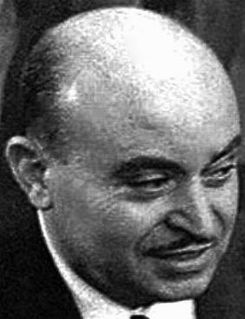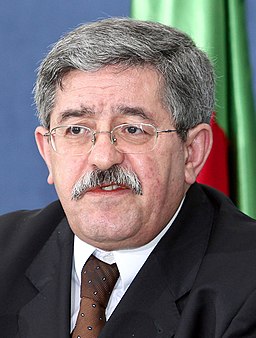
Politics of Algeria takes place in a framework of a constitutional semi-presidential republic, whereby the President of Algeria is head of state while the Prime Minister of Algeria is the head of government. Executive power is exercised by the government. Legislative power is vested in both the government and the two chambers of parliament, the People's National Assembly and the Council of the Nation. A legacy of Algeria's bloody War of Independence from France is a powerful military and security apparatus that put a high value on secrecy. Since 1988, parties other than the ruling FLN have been allowed and multiparty elections have been held, but freedom of political speech, protest and assembly is circumscribed, and the 2014 presidential election was boycotted by major opposition parties. Algeria has been called a "controlled democracy", or a state where the military and "a select group" of unelected civilians—reportedly known to Algerians as "le pouvoir" —make major decisions, such as who should be president.

Presidential elections were held in Algeria on 8 April 2004. Incumbent President Abdelaziz Bouteflika was re-elected with 85% of the vote.
A presidential election is the election of any head of state whose official title is President.

Algeria elects on national level a head of state - the president - and a legislature. The president is elected for a five-year term by the people. People's National Assembly has 462 members, elected for a five-year term in multi-seat constituencies by proportional representation. Eight seats in the national assembly are reserved for Algerians abroad. The Council of the Nation has 144 members, 96 members elected by communal councils and 48 members appointed by the president. Algeriawesh alors has a multi-party system, with numerous parties in which no one party often has a chance of gaining power alone, and parties must work with each other to form coalition governments. According to a US Embassy cable, the 2009 presidential elections were "carefully choreographed and heavily controlled", with the official turnout figure "exaggerated" by at least 45%.

The People's National Assembly, abbreviated APN, is the lower house of the Algerian Parliament. It is composed of 462 members directly elected by the population. Of the 462 seats, 8 are reserved for Algerians living abroad. Members of the People's National Assembly are directly elected through proportional representation in multiple-member districts and serve terms lasting five years at a time. The last election for this body was held on 17 May 2017. This body and of the Algerian Parliament is seen as nonrepresentative of the Algerian people's interest because of the presidency, which controls the majority of governmental power. The minimum age required for election into the APN is 28.

The Council of the Nation is the upper house of the Algerian Parliament. It is composed of 144 members, 2/3 of which are elected indirectly and 1/3 of which are appointed by the president.

French legislative elections took place on 18 November and 25 November 1962 to elect the second National Assembly of the Fifth Republic.

Abderrahmane Farès was the Chairman of the Provisional Executive of Algeria from 3 July 1962 to 20 September 1962.

Elections to the new People's National Assembly were held in Algeria on 25 February 1977. They were the first parliamentary elections since 1964, as the previous National Assembly had been dissolved in 1965, and were held as a result of the country's new constitution and electoral law being promulgated the year before.

General elections were held in Mauritania on 8 August 1976 to elect a President and National Assembly. At the time, the country was a one-party state with the Mauritanian People's Party (PPM) as the sole legal party. Its leader, incumbent President Moktar Ould Daddah, was the only candidate in the presidential election, and was re-elected unopposed, whilst the PPM won all the seats in the National Assembly election. Voter turnout was 97.9%. They were the last elections held until the restoration of multi-party democracy in 1992.

A constitutional referendum was held in Algeria on 8 September 1963. The new constitution had been drawn up by the Constituent Assembly elected in 1962, and was approved by 98% of voters, with a turnout of 82.7%.

Elections for a new Assembly were held in French colonial Algeria on 4 and 11 April 1948. The new 120-seat Assembly was to be elected by two colleges, each of which would vote for 60 seats; one college represented around 1,500,000 Europeans and Algerian Jews, plus a few thousand "évolué" Muslims, and the second of around 8,000,000 "indigenous" Muslims. Following the victory of the Movement for the Triumph of Democratic Liberties (MTLD) in the 1947 local elections, and with the MTLD and fellow nationalist UDMA set to win a majority in the Second College in the second round of voting, the authorities openly rigged the results in more than two-thirds of seats to ensure the victory of pro-government independents. the Assembly elections were manipulated by the authorities to ensure a favourable result. The rigging was so brazen that the phrase "élection algérienne" became synonymous with rigged elections.

Elections to the National Assembly of France were held in Algeria on 17 June 1951. There were 30 seats for Algeria out of 625 at the National Assembly and 14 at the Council of the Republic (Senate).

The 2003 United Nations Security Council election was held on 23 October 2003 at United Nations Headquarters in New York City during the 58th session of the United Nations General Assembly. The General Assembly elected five non-permanent members of the UN Security Council for two-year terms commencing on 1 January 2004.

Elections to the National Assembly of France were held in Algeria on 21 October 1945. The election was held with two colleges, citizens and non-citizens.

Elections to the National Assembly of France were held in Algeria on 20 February 1876 as part of the wider National Assembly elections.

Elections to the Algerian Assembly were held in Algeria in February 1954. Like other post-1948 elections in French Algeria, it was rigged by the authorities to ensure the defeat of Algerian nationalists.

Municipal elections were held in Algeria in October and November 1947, with councils in large cities elected in October, and those in smaller towns in November.

Parliamentary elections were held in Algeria on 4 May 2017.











